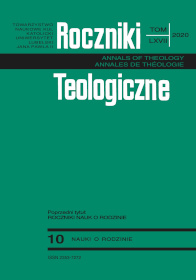Polityka rodzinna w Niemczech – podmioty i instrumenty
Family Policy in Germany – Subjects and Instruments
Author(s): Jerzy KoperekSubject(s): Social Sciences, Sociology, Family and social welfare
Published by: Towarzystwo Naukowe KUL & Katolicki Uniwersytet Lubelski Jana Pawła II
Keywords: family policy in Germany; family benefit [Elterngeld]; child benefit (Kindergeld); supplement for children [Kinderzuschlag]; parental leave [Elternzeit]; maternity benefit [Mutterschaftsgeld];maternité;
Summary/Abstract: The family policy of the state is important in the fight against low birth rates. Germany, as a European Union country, has one of the lowest fertility rates, which is only 1.37. The country has a long tradition of making all public efforts to develop the family and encourage citizens to give birth to offspring. The article, focusing on social policy in Germany, presents instruments and transfers that are used by the German government to carry out family policy tasks in the fight against low birth rates.The analysis of family policy instruments in Germany was presented in the context of the following issues: subjects of family policy; state benefits for the family (family benefit [Elterngeld]; child benefit [Kindergeld], supplement for children [Kinderzuschlag]; parental leave [Elternzeit]; maternity benefit [Mutterschaftsgeld] and maternity protection [Mutterschutz]; help for women returning to work).
Journal: Roczniki Teologiczne
- Issue Year: 67/2020
- Issue No: 10
- Page Range: 111-128
- Page Count: 18
- Language: Polish

